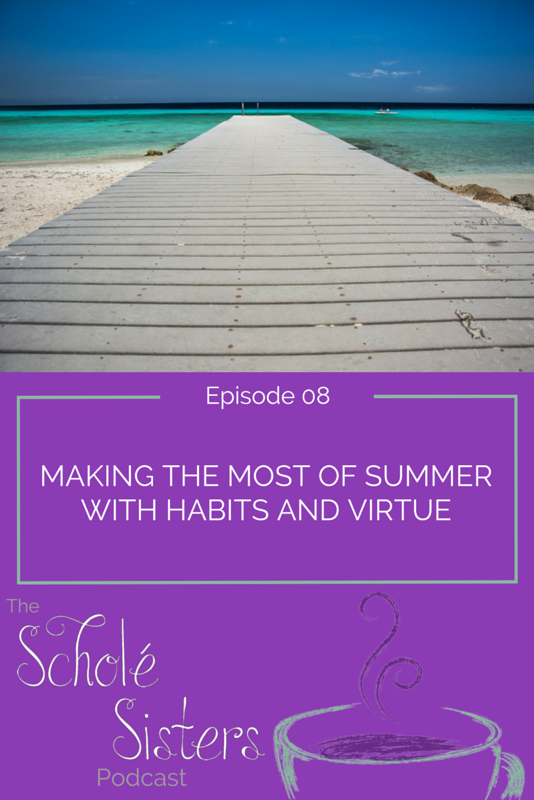Summer is a time for habit building.
[pullquote align=”center”]
[/pullquote]
In episode 8 of the Scholé Sisters podcast Brandy and I discussed habits for both mom and kids in light of Aristotle’s thoughts on habit and virtue from Nichomachean Ethics.
There’s a lot of talk about character training in homeschool circles. Knowing they want to focus on character and virtue rather than facts, homeschool moms reach out to curriculum providers for solutions to this seemingly nebulous issue. How can we train character? What does it mean really?
This is not an issue exclusive to the modern era. It’s only an issue we’ve lost touch with, not realizing there’s a long history and tradition behind training good character – in fact, that’s what education was for in the classical and medieval periods.
And how was it taught? Through habits. Manners. Comportment. Aristotle was all about character training and it didn’t involve stickers or skits or marbles in a jar.
Charlotte Mason picked up on the correlation between virtue, character, and habit, and also instructed mothers and teachers to use habit as the means for character-training – no bribes, prizes, or “fun” required.
Read Brandy’s article “The Primacy of Habit.”
So, with school wrapped up and a little more mental energy and time available, what habit training can we do this summer? In the podcast we talked about why we use summer to build habits, and we gave some examples, but we recorded it in April and I hadn’t really yet thought about what our summer habits would be this year.
Now our summer break has begun and those decisions have been made.
The temptation, especially at the end of the school year, is to see the worst parts of our day and of everyone’s character and our own faults and want to try to fix it all in a week or a month, totally turning over a brand new leaf and making everyone into totally new people.
That’s not going to happen, turns out. I’ve tried it before and it doesn’t work.
So now I limit my expectations and direct my attention toward a handful of practices that will make a big difference.
For a summer habit reboot, I choose 2-3 habits to work on with the kids, 2-3 habits to work on for myself, and 2-3 routine habits to shore up in our day.
Here’s my habit building plan for summer 2016:
Habits for me
- Eat low-carb & little-sugar; drink lots of water. I’ve been working on this for a couple months now (well, off-and-on for years, actually). I feel like I’m close to breaking my particular food-related weaknesses, so I want to keep it strong over the summer instead of going into “vacation mode.” This will help my energy and coping strategies when school starts again.
- Evening review & chore board update. Over the last few months, I’ve been experimenting with different methods for my daily index card. That’s added resistance to my evening routine because I haven’t been clear on what I’m doing. I’ve made decisions now, though, and need to get back into the habit. If I add the habit of updating the public notice board for everyone the evening before, our school mornings will go more smoothly, too.
- Daily reading time. In theory, I have time carved out first thing in the morning, during lunch, and in the evening for reading. In practice, it’s way too easy to skip it. I want to prioritize my reading time over the summer.
Habits for the kids
- Tone. I’m the one who models tone, and we all need to work on how we talk to one another, how we call one another, and how we admonish or remind one another. If the way they nag on each other is an imitation of what they’re hearing from me (and I’m afraid it is), I have some work to do.
- Gratitude. Somehow our habits of saying please and thank you to one another seem to have disappeared. So we’re going back to basics. It fits well with tone, also.
The primary tactic for teaching these habits is not actually jumping on the kids for every violation (not that I haven’t and still don’t try it), but modeling both. I am the one who sets the tone. I am the one who models either gratitude or entitlement.
The secondary tactic for teaching these habits is simply requesting (cheerfully – remember the tone!) a do-over as needed. Sometimes I make them leave the room and re-enter to try again from scratch. Telling them how I want them to say it and then making them follow the model addresses that muscle-memory part of habit. It’s not about giving commands and expecting perfect obedience to rules, but about practicing over and over again until it becomes natural – a habit, a part of their character.
That takes years.
Habits for the day
- Chore time. I’ve revamped our chores, giving each person a bump up in responsibility corresponding to abilities. Now I need to make sure and follow through consistently with inspections and expectations. I don’t have to check math pages, so surely I can check chores.
- Morning agenda. We won’t do a full Morning Time during our summer break, but we will have a short time together to set the tone and let everyone know what the day holds. Praying together and being on the same page shouldn’t be a school-day-only part of our lives.
- EHAP. It’s not just a school-year thing. Everyone will be expected home by 5pm, when we will tidy up, put away laundry, set the table, and then have dinner.
How about you?
I’d love to hear what habits you’ll be working on this summer! Let’s chat in the comments. Feel free to share a link if you’ve written about your summer habit or reading plans!
Learn how to
[columns]
[column]

[/column]
[column]

[/column]
[/columns]



